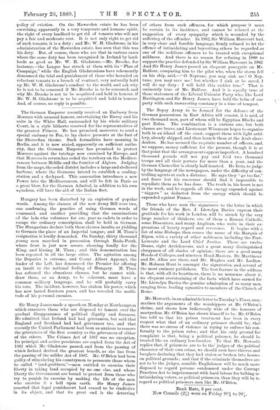Sir Henry James made a speech on Monday at Northampton
which reassures those who are disposed to lament over the gradual disappearance of political dignity and firmness. He admitted that Ireland had had grievances, but said that England and Scotland had had grievances too, and that recently the United Parliament had been as anxious to remove the grievances of the first country as the grievances of either of the others. The Crimes Act of 1887 was no exception. Its principal and active provisions are copied from the Act of 1882 which Mr. Gladstone passed, and from the passing of which Ireland derived the greatest benefit, as she has from the passing of the milder Act of 1887. Mr. O'Brien had been guilty of stimulating his countrymen to persecute those whom he called "land-grabbers,"—men entitled to exercise their liberty in taking land occupied by no one else, and whose liberty the Government are bound to protect from those who try to punish its exercise by making the life of the men who exercise it a hell upon earth. Sir Henry James asserted that legal punishment had ceased to be vindictive in its object, and that its great end is the deterring of others from such offences, for which purpose it must be certain in its incidence, and cannot be relaxed at the suggestion of every sympathy which is wounded by the suffering of the offender. In 1882, Sir William Harcourt had, in very clear and forcible language, firmly refused to let the offence of intimidating and boycotting others be regarded as one of the seditious offences to be treated with exceptional mildness. And there is no reason for refusing in 1889 to support the practice defended by Sir William Harcourt in 1882- And Sir Henry James passed an eloquent panegyric on Mr. Balfour, comparing him to the pilot who, when the storm fell on his ship, said,—" 0 Neptune, you may sink me ! 0 Nep- tune, you may save me ! but whether I sink or be saved, I will do my duty : I will hold this rudder true." That is eminently true of Mr. Balfour. And it is equally true of those statesmen of the Liberal Unionist Party who, like Lord Hartington and Sir Henry James, have held the helm of our party with such unwavering constancy in a time of tempest.


































 Previous page
Previous page